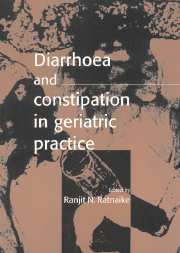Book contents
- Frontmatter
- Contents
- List of contributors
- Preface
- Acknowledgments
- Foreword by Gary R. Andrews
- I Defences of the aging gastrointestinal tract
- II Diarrhoea
- III Noninfectious clinical entities
- IV Constipation
- V Perspectives of altered bowel function
- 18 Issues of nutrition
- 19 The nursing care of older people with diarrhoea and constipation
- Index
18 - Issues of nutrition
Published online by Cambridge University Press: 17 August 2009
- Frontmatter
- Contents
- List of contributors
- Preface
- Acknowledgments
- Foreword by Gary R. Andrews
- I Defences of the aging gastrointestinal tract
- II Diarrhoea
- III Noninfectious clinical entities
- IV Constipation
- V Perspectives of altered bowel function
- 18 Issues of nutrition
- 19 The nursing care of older people with diarrhoea and constipation
- Index
Summary
Introduction
The relatively rapid and universal increase in longevity has been attributed, amongst other things, to an improvement in nutrition in both childhood and later life. The increasing attention being paid to nutrition in hospital patients, institutionalized elderly and those with risk factors for the chronic noncommunicable diseases, has also played a role.
One of the factors involved in the nutritional consequences of disease is that older people generally have a reduced safety margin in times of nutritional stress. Nutrient stores are often less, intake sometimes marginal and utilization less efficient. Consequently, the onset of disease, or a chronic state, both of which can be presenting forms of diarrhoea, can adversely affect the nutritional status of the elderly patient.
A reduction in the nutritional status can negatively affect the immune state of the elderly person, leading to an increase in infections, or a reduction in the ability to fight pre-existing gastrointestinal infection. This may therefore initiate a cycle in which the poor nutritional state leads to sustained disease which, in turn, leads to further impairment of nutrition. In a study in the USA which looked at the characteristics related to elderly persons not eating for one or more days, diarrhoea itself was one factor involved.
In children the effect of diarrhoea on nutritional status depends upon the level of energy (calorie) intake, just as the negative effect of an inadequate energy intake on nutritional status depends on the severity and duration of diarrhoea.
- Type
- Chapter
- Information
- Diarrhoea and Constipation in Geriatric Practice , pp. 203 - 214Publisher: Cambridge University PressPrint publication year: 1999



